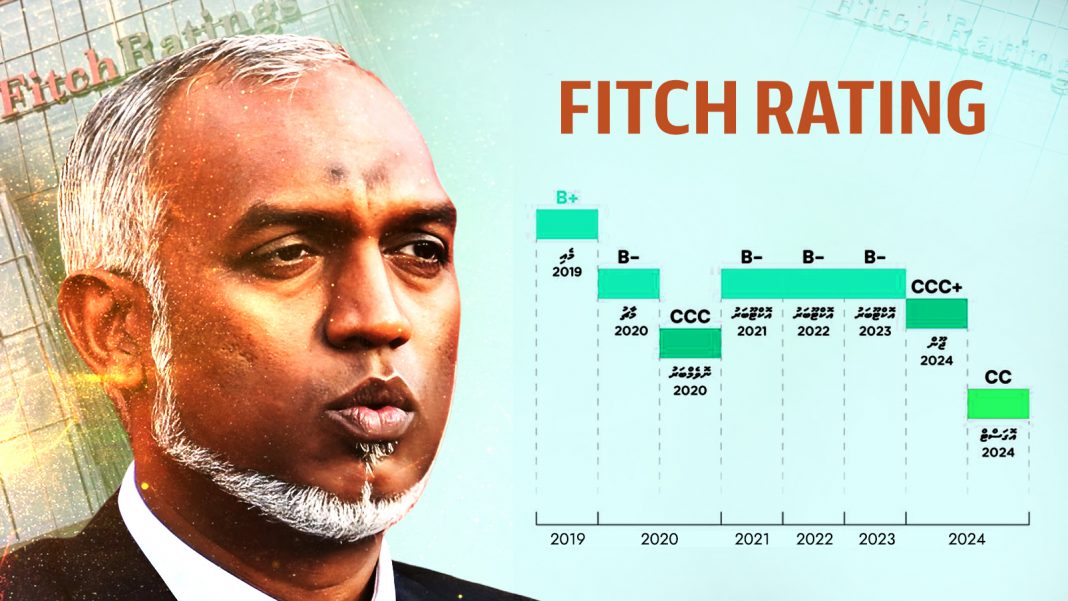02 Sep 2024 - {{hitsCtrl.values.hits}}
 Fitch Ratings recently downgraded the Maldives' Long-Term Foreign-Currency Issuer Default Rating (IDR) to 'CC' from 'CCC+', signaling a very high risk of default. This downgrade reflects growing concerns about the Maldives' ability to meet its financial obligations, with a heightened risk of default. The rating suggests the Maldives is facing severe financial stress, struggling to meet its external debt obligations.
Fitch Ratings recently downgraded the Maldives' Long-Term Foreign-Currency Issuer Default Rating (IDR) to 'CC' from 'CCC+', signaling a very high risk of default. This downgrade reflects growing concerns about the Maldives' ability to meet its financial obligations, with a heightened risk of default. The rating suggests the Maldives is facing severe financial stress, struggling to meet its external debt obligations.
The downgrade is primarily due to the country's deteriorating external financing and liquidity metrics, including a significant drop in foreign exchange reserves and rising external debt service. The Maldives' gross foreign-exchange reserves fell by about 20% to USD 395 million in July 2024, the lowest level since December 2016.
Persistent US dollar shortages and high current account deficits have further pressured the country's financial stability. The 'CC' rating underscores the heightened risk of the Maldives defaulting on its debt.
This downgrade has several significant implications, including increased borrowing costs, eroded investor confidence, limited access to international markets, and potential economic instability. The Maldives is likely to face higher interest rates on any new debt, making it more expensive to borrow money.
The downgrade could also lead to reduced foreign investment and hinder the Maldives' ability to raise funds internationally. The government may need to implement austerity measures, impacting public services and development projects. Additionally, persistent US dollar shortages and declining foreign exchange reserves could put further pressure on the Maldivian rufiyaa, possibly leading to its depreciation. Combined, these factors create a challenging economic environment for both the government and the general population.
President Mohamed Muizzu's administration has faced significant economic hurdles, including high levels of debt, declining foreign exchange reserves, and the impacts of global economic conditions. There has been criticism of the administration's handling of these challenges, particularly in managing external debt and diversifying the economy beyond tourism. Calls for more effective fiscal policies to improve tax collection, reduce public spending, and enhance government efficiency have grown louder. Given the severity of the financial situation indicated by the Fitch downgrade, there are reports that the Maldives is exploring options for debt restructuring or obtaining financial assistance through discussions with creditors.
Under President Muizzu's administration, the Maldives has also faced governance challenges, including political infighting, allegations of corruption, and concerns about foreign policy. Muizzu's pro-China and anti-India stance has raised concerns about the Maldives' diplomatic relations and financial agreements, leading to a noticeable decline in Indian tourists—a critical component of the Maldivian economy.
Domestically, political tensions have increased due to allegations of political favoritism in appointments and the regulation of state-owned enterprises. There have been instances where individuals were dismissed from their positions due to their political affiliations, undermining trust in the government's commitment to fairness and inclusivity.
The government's decision to bolster spending amid proposed reforms has raised questions about its fiscal prudence, with the IMF emphasizing the need for immediate policy adjustments to safeguard macroeconomic and financial stability.
The Muizzu administration has been actively seeking financial support from various countries to manage the economic crisis. However, securing the necessary level of assistance has been challenging. Bahrain and Saudi Arabia, for instance, have indicated that direct financial assistance is not currently feasible, though they have expressed willingness to support the Maldives in obtaining financial aid through international organizations.
The Monetary Authority of Maldives’ heightened exposure to government bonds further highlights the risks associated with the administration’s economic policies. These structural challenges, coupled with evident vulnerabilities, underscore the need for a comprehensive economic strategy.
The complexity of debt restructuring and the global economic environment continue to pose significant challenges for the Maldives under President Muizzu’s leadership, contributing to a complex and often contentious political landscape.
19 Sep 2024 8 hours ago
19 Sep 2024 8 hours ago
19 Sep 2024 9 hours ago
19 Sep 2024 19 Sep 2024
19 Sep 2024 19 Sep 2024